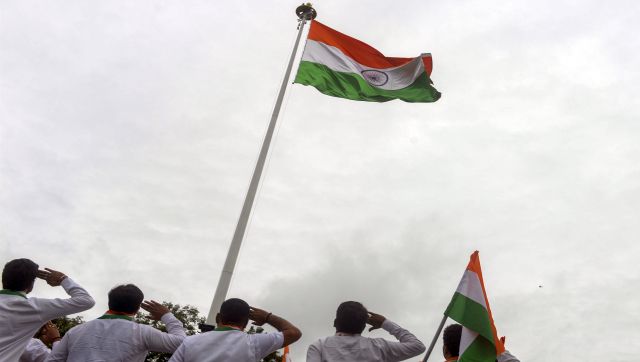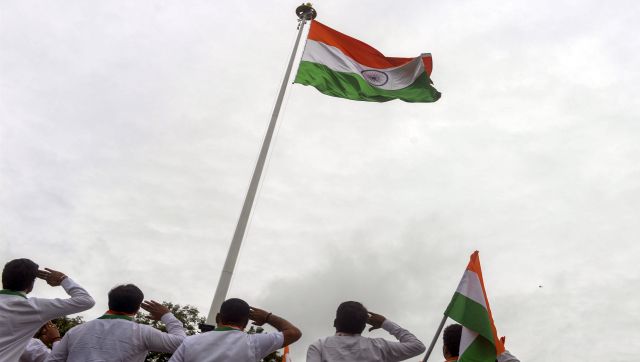Today is the death anniversary of Sarojini Naidu [1879-1949>, one of India’s most illustrious poets and freedom fighters, who is known as Bulbul-e-Hind or the Nightingale of India.
My first encounter with her was through her poems in my English textbooks. I learnt about her contributions to India’s freedom struggle much later because history textbooks tend to privilege the adventures and achievements of men. Women get relegated to a footnote or two.
The first Naidu poem that I ever read was In the Bazaars of Hyderabad. I was – and still am – struck by the drama and colour that her words conjure, her majestic ability to invoke a festive atmosphere. She is often dismissed for self-orientalising through her poetry but I think of her as a poet who invites me to travel with her to an imagined landscape on a magic carpet.
In this poem, Naidu writes of merchants sell “Turbans of crimson and silver/ Tunics of purple brocade, / Mirrors with panels of amber, / Daggers with handles of jade.” She speaks of maidens grinding sandalwood, henna, and spice, and vendors weighing saffron, lentil, and rice. The picture of the thriving marketplace includes peddlers, goldsmiths, fruit-men, musicians, and flower-girls. When I was a child, this was a fantasy land. But as an adult, I got the opportunity to travel to Hyderabad, and study at a university there. This poem came alive for me every time I paid a visit to the Charminar, and walked in the surrounding markets.
Two other poems by Naidu – The Bangle Sellers and Palanquin Bearers – seem to be drenched in shringar ras. She calls the bangles “rainbow-tinted circles of light” and “lustrous tokens of radiant lives/ For happy daughters and happy wives.” There is beauty and blessing in these words, shaped by a capacity to envision the transcendental in the mundane.
Her verse from Palanquin Bearers requires no commentary. The music says it all.
“Lightly, O lightly we bear her along, She sways like a flower in the wind of our song; She skims like a bird on the foam of a stream, She floats like a laugh from the lips of a dream. Gaily, O gaily we glide and we sing, We bear her along like a pearl on a string.”
Another beautiful poem is Indian Dancers. It is filled with sensual imagery so I am not surprised that it did not make it to my school textbooks. Here, Naidu writes about “eyes ravished with rapture, celestially panting” and “passionate bosoms aflaming with fire.” The poem itself seems bathed in ecstasy. Naidu writes about tangled hair, soft feet, quivering air, the scent of roses, smiles entwined like magical serpents, and lips that are sweet like opiate.
Her debut book The Golden Threshold [1905> was published in London with an introduction by poet-critic Arthur Symons, who saw in her poems “the temperament of a woman of the East, finding expression through a Western language and under partly Western influences.” This confluence was possible because she was born into a Bengali family in Hyderabad that sent her to King’s College, London, and Girton College, Cambridge, for higher education. Her father wanted to become a scientist or mathematician but she found a calling in poetry.
I wonder why our school teachers never highlighted the fact that she had an inter-caste marriage, and her parents were not particularly happy about a Chattopadhyay marrying a Naidu. Looking back, I see how common it was for teachers to focus only on the words on the page, and not acquaint us with ideas that seemed threatening to the social and political order.
Kamaladevi Chattopadhyay, a social reformer and freedom fighter, once described Naidu as “a genuinely cosmopolitan personality” in The India Quarterly: A Journal of International Affairs [1981>. She appreciated Naidu for being at home “among the lowliest and the poorest as among the affluent elites,” and her “appeal to people of all faiths, colour, and languages."
In her poem Coromandel Fishers, Naidu writes:
_“Rise, brothers, rise; the wakening skies pray to the morning light, The wind lies asleep in the arms of the dawn like a child that has cried all night. Come, let us gather our nets from the shore and set our catamarans free, To capture the leaping wealth of the tide, for we are the kings of the sea!” _ Naidu’s words tug at the heart, and inspire readers to approach the world with a sense of optimism and possibility. What is ironic is that she was fighting against British rule but was also inspired by the tradition of British Romanticism and lyric poetry.
She used the power of language not only to delight and entertain but also to invigorate and rouse people to action.
In 1918, her poem Awake was published in Young India, a weekly newspaper started by MK Gandhi. This was soon after she was elected President of the Madras Provincial Conference. In this poem, Hindus, Parsis, Muslims, Christians, and people of “all [other> creeds” vow to dedicate their lives to Mother India. They call her a “queen” and a “goddess.” They kneel before her, and promise, “Ne’er shall we fail thee, forsake thee, or falter.”
She also wrote poems featuring historical personalities, mythological characters, and legends.
Naidu’s life and work have inspired the writing of several books. These include Padmini Sengupta’s Sarojini Naidu: A Biography [1966>, Tara Ali Baig’s Sarojini Naidu [1974>, Khwaja Ahmad Abbas’s Sarojini Naidu: An Introduction to a Fascinating Personality [1980>, Hasi Banerjee’s Sarojini Naidu, the Traditional Feminist, a volume titled Sarojini Naidu: Her Way with Words [2013>, edited and introduced by Mushirul Hasan, Sarojini Naidu: The Nightingale and the Freedom Fighter [2014>, edited by Anu Kumar, and VS Naravane’s Sarojini Naidu: An Introduction to Her Life, Work and Poetry [2018>.
Naidu’s contribution to India’s freedom struggle goes beyond her literary gifts. She was a satyagrahi. She participated in the Non-Cooperation Movement and the Dandi March. She served as the President of the Indian National Congress when India was under British rule. After India became independent, she served as the governor of the United Provinces.
In The International Encyclopedia of Revolution and Protest [2009>, edited by Immanuel Ness, Soma Marik draws attention to Naidu’s work advocating for women’s suffrage. Marik writes, “Sarojini Naidu’s public lectures and her consistent campaign of women’s rights brought many other women into politics. A strong advocate of Hindu-Muslim unity, Sarojini used her lectures and other meetings to make demonstrative gestures, such as calling on Rani Narendra Nath and Lady Zulfikar Ali to join hands, an event that left a deep impression on the minds of observers.” Naidu also wrote a biography of Mohammad Ali Jinnah.
Anupama Arora’s article “The Nightingale’s Wanderings: Sarojini Naidu in North America” [2009> in the Journal of Commonwealth Literature is a fascinating exploration of how Naidu challenged paternalistic and colonial rhetoric by turning it on its head and offering rejoinders. Arora writes, “Naidu refuses to map the West as the site of modernity and self-making for an Indian woman, rejects an interpretation of India which sees it as a traditional, and thus stifling space, from which travel is an escape for the Indian woman.” Naidu presents herself as a “free” and modern Indian woman going to the West to teach rather than be tutored.
Much has been written about Naidu, and more will be written. This reassessment will help us understand our own history better, and develop a greater appreciation for women leaders.
Chintan Girish Modi is a writer, journalist, commentator and book reviewer.
Read all the Latest News , Trending News , Cricket News , Bollywood News , India News and Entertainment News here. Follow us on Facebook , Twitter and Instagram .


)




)
)
)
)
)
)
)
)